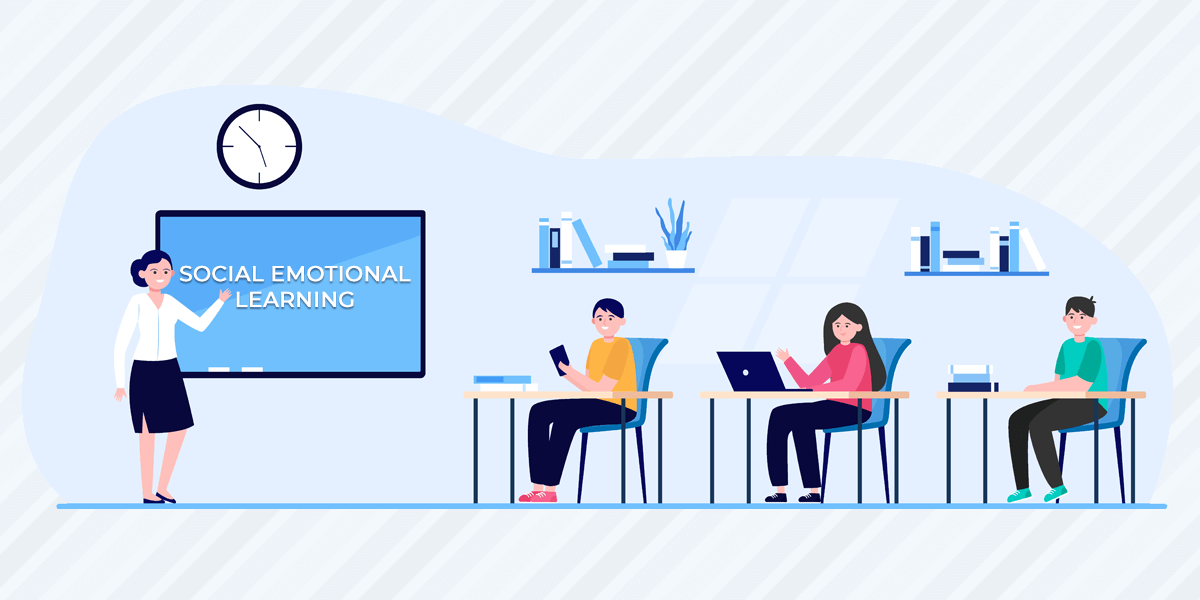Early childhood teachers and educators play a very crucial role in the life of children. Hence, it is essential for teachers to foster social emotional learning skill in students to build mental health and resilience.
Ever wondered why parents send their children to schools? Is it solely for academic prowess or something more? Teaching a particular subject and giving an academic overview is not enough. Training them to be a valuable member of society is a must as today’s children are the future. What kind of world are leaving behind for the children and how will the world be in future? All of it depends on what kind of values we instill in them. Hence, Social and Emotional Learning for children is of the utmost importance.
What is Social-Emotional Learning?
Social-emotional learning is a process where interpersonal skills, self-awareness, and self-control which are essential for school, work, and success, are developed in a child.
Children that are instilled with strong social-emotional skills are said to excel in their academics and as they grow up they can cope with everyday challenges and benefit socially and professionally as well. Who wouldn’t want the best for their children? With the initiation of social-emotional learning in schools, it creates a positive atmosphere which helps the children to thrive and they are nurtured to be better humans as they grow up.
Core aspects of social-emotional learning
social emotional learning works and revolves around developing the core aspects of an individual which are said to be the very basis of soft-skills and allows them to perform well consistently. These core competencies are broadly divided into 5 aspects:
- Self-awareness: This involves understanding one’s capacity such as emotions, personal goals, and values. It majorly focuses on working around the strengths and weaknesses of the children. Being able to recognize that the thoughts, feelings, and actions are interconnected and is a sign of a higher level of self-awareness.
- Self-management: In this aspect, it focuses on skills and approaches that facilitate the ability to regulate one’s emotions and behavior. This includes the ability to manage stress, control impulses, and overcome challenges to achieve personal and academic goals.
- Social awareness: This involves the ability to understand, feel, and empathize with those who are from different backgrounds or cultures. It also involves understanding the norm of society for inculcating better behavior.
- Relationship skills: Maintaining relations among peers and mentors will help the children in the long-term. The skills here include clear communication, active listening, teamwork, negotiation, resolving conflicts, and reaching out for help when needed.
- Responsible decision making: Being able to make an informed decision is one of the most critical skills that is encouraged. It involves the ability to consider ethical standards, behavioral norms, practical evaluation of various actions, and their consequences.
Implementing Social Emotional Learning in Schools
With all the benefits mentioned above, a common question remains. How do we implement it? Implementing anything new in a school curriculum is always a challenge. But the benefits of social-emotional learning in the classrooms are commendable and cannot be ignored. Hence, here is 5 step guide to implementing social-emotional learning in schools:
- Create: The purpose of this step is to create a caring, nurturing, and safe atmosphere where the children can learn and flourish well.
- Integrate: Incorporating social emotional learning into academics whenever possible is the essence of this principle. It is about prioritizing social and emotional learning and finding ways to incorporate it in daily academic activities.
- Communicate: This principle focuses on putting forth the objectives of SEL and communicating with colleagues or partners about concerns and progress. The mentor provides strategies to communicate with parents, school staff, and team members.
- Instruct: Clear guidance and instructions are necessary to execute a particular strategy. With clear guidance, students will be able to understand the contents of social emotional learning and keep in mind the expectations of the same.
- Empower: This is the very core of social-emotional learning where the children are empowered and encouraged to take charge of their own social and emotional development. It ensures that the students are supported and are ready to take on challenges confidently.
School leaders can play a significant role in building a positive relationship and a sense of community among students. As teaching science, arts, and similar is important, promoting skills like social emotional learning, digital citizenship is also crucial to lead a successful life. Many schools have taken the initiative to include emotional development programs for students to lay a base for constructive growth and behaviour. We can help our students increase their social-emotional competencies in order to make them responsible citizens in the future.

